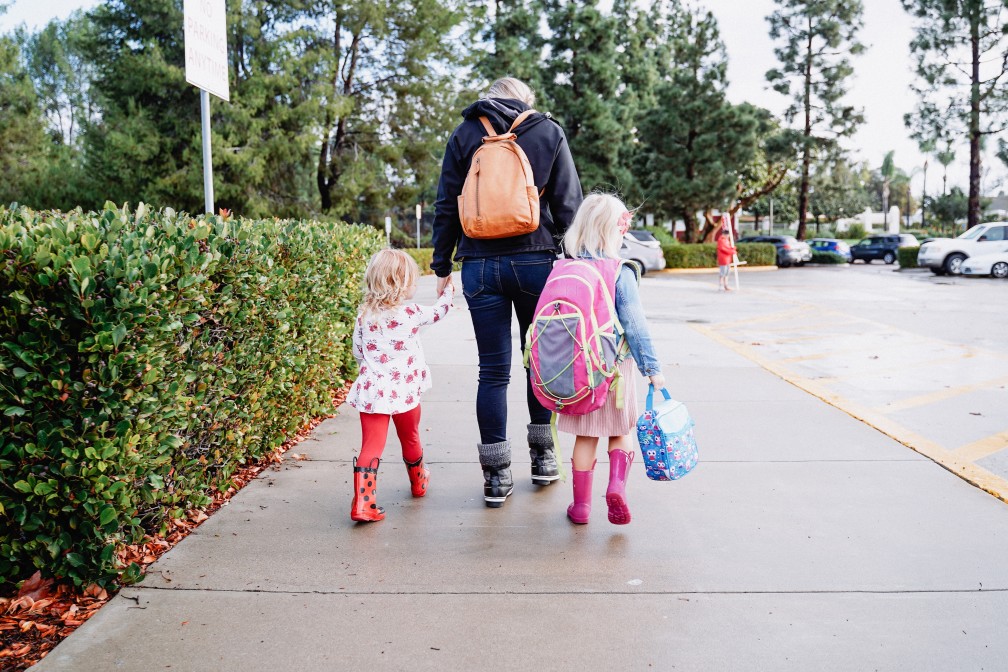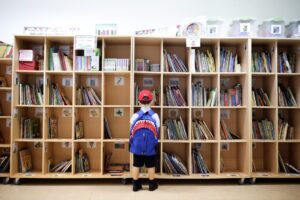Any working parent who has had to utilize daycare for their child has experienced the guilt of that decision. Whether it be self-inflicted or someone providing their unsolicited opinion, there is sometimes a negative connotation with daycare and taking advantage of all it has to offer for our children. Why? How are parents supposed to work and earn money, but also care for their children on their own as well? For most families, this just simply isn’t possible. We as parents in the workforce need a village who is there precisely with the purpose of caring for our children. This is why daycare exists for us. A quality daycare or preschool will not only care for your child while you are away, but they will also provide educational benefits you couldn’t even imagine.
A Growing Workforce
Daycare hasn’t been around forever because back when gender roles were a concrete thing, U.S. women, for the most part, stayed home. Their “job” was house and home and child-rearing. While daycare and preschool became most popular in the ‘70s and ’80s (more on that in a minute), the first daycare actually goes all the way back to Italy and France in the 1840s, and was actually signed into law in the late 1860s. For countries such as France, daycare had been built into their welfare and regular schooling systems. Sounds a lot like preschool, right? Clearly, they were on to something and saw the benefits very early on.
In the U.S, daycare started off at first as a way to assist lower-income immigrant families in the late 1800s. During the Depression, there were even federally backed programs for this, but those programs ended when the Depression did. Daycare for the working mother didn’t truly take off until the time of WWII. Because all of our men were being sent overseas, many women had to start entering the workforce, some even working in the factories. Not only that, but sadly many of these women also became widows, and so they had no choice but to become the breadwinners for their families. It was starting to look like maybe those other countries knew what they were doing, and the U.S. adopted the practice of daycare.
While it existed in the U.S., preschool and daycare still had yet to really take off until family dynamics started to change a couple of decades later. In the ‘70s and ‘80s, more women were starting to enter the workforce, and more children started going to daycare. That era formed the version of daycare that comes to our minds today.
BENEFITS
So, you read that brief little history on daycare and thought great! I’m glad I now have somewhere to send my kids. But…what does it do for them? Is it beneficial in any way? Is being away from us only going to be detrimental to our kids in the long run?
As any good parent should, we constantly wonder whether we are doing the right thing for our kids, daycare included. I mean, we’re trusting someone else with our children, right? Well, we’re here to share some good news. It has been scientifically proven that daycare and preschool are amazing resources for children and parents alike. Daycare and preschool are essentially laying the entire foundation of who our children will be in kindergarten, throughout school, and even into adulthood. Kids’ minds are amazing little sponges, and below, we’re going to talk about the top six ways daycare and preschool benefit your kiddo.
Socializing
This one is no secret at this point, right? When you hear people talking about the benefits of sending your kids to preschool, this is probably one of the more popular things people like to promote. “It’s great for socialization!” you hear, over and over. Well, what does that mean exactly?
Socialization in short means that they’re learning to be a part of society. This isn’t just making friends; they’re learning how to interact with other kids and how to treat other humans. Getting your kiddo into preschool or daycare gives them a jump start on how to act in different situations. “But they have siblings,” you say. It’s crazy, but socializing with family and socializing with other kids is completely different! Being in school gets them out of the family dynamic they are so used to. Siblings and friends are two totally different ball games.
When learning to socialize, they are learning important life skills like how to communicate, how to vocalize their feelings, and how to work together. While in a daycare or preschool setting, through play, your child is able to build the skills they need to have an amazing school career.
School is in Session!
So, we just talked about how laying the foundation of socialization can follow them all the way into adulthood, as our little babies turn into big kids and then into adults. This transitions quite nicely into talking about laying the groundwork of education. When sending your children to daycare or preschool, this gets them used to a classroom setting. Even when learning through play, kids are taking in the structure of a classroom, learning with other kids (socialization!), and getting used to being instructed by a teacher. Having that one to two years before kindergarten really helps that transition into elementary school go a whole lot smoother.
Science and Math and Language, Oh My!
Along with getting used to the structure of school, kids in preschool begin to learn amazing things! Daycare is no longer simply a place to send your children while you go to work. Daycare is a place full of curriculum-based learning. That’s right, even our little toddlers are taught based on a curriculum. Hold on though — it’s not as daunting as it may seem. There are times when children are learning math and problem solving, and yet, they have absolutely no idea they are being provided the opportunity to learn such skills.
Think about it this way. When a child is playing with a simple set of blocks, they are actually learning an incredible amount. They are learning problem-solving, symmetry and balance, motor skills, even how to share, how to clean up, and classification. Wow, right? That is like a day’s worth of schooling just by playing.
Let’s talk about coloring and art! When doing art projects at daycare, your child is becoming more and more ready for school. What we consider the simple skill of holding a crayon or marker is helping them develop their dexterity. Art unleashes the imagination and encourages self-expression. Have you ever watched your child in the midst of a creation? Their laser focus is astonishing. Encouraging art helps them develop all of this.
Science is particularly fun at this stage in a child’s life. Not only does it spark the amazing curiosity of a child, but their little brains are also continuously taking it all in. Looking at the leaves on the playground, watching the teacher do something with vinegar and baking soda, even simply putting food coloring in a flower’s water are all amazing things your child can learn and take in at preschool and daycare. There are all of these little things we don’t even realize that have a huge impact on our child’s education, and it can all happen in preschool.
Feelings. Lots of feelings.
Our littles feel lots of things and can’t always communicate their frustrations. This is another area where preschool and daycare definitely help. Did you know we teach Sign Language here at The Breakie Bunch? Sign Language is an amazing tool for young children to have. Think of how hard it would be to feel frustrated or hungry or sad, and the only thing you could do is cry or fuss? Our littles could do more than that if they simply knew HOW! And that is where ASL is fantastic. Learning sign language opens children up to the ability to communicate. Simple signs that dictate hungry, tired, more, please and thank you, and mommy and daddy can bring down the emotional intensity our children sometimes feel because they finally have a way to tell us what they need. How awesome is that?
Emotional learning also ties in with the socialization we mentioned above. Seeing how other children react to situations in preschool and daycare helps your child understand social norms and the like, and therefore, our children learn off of each other’s behaviors in an amazing way. When spending time with friends in this setting, they’ll learn empathy, conflict resolution, and communication skills that will take them into grown-up years (don’t cry yet, we’re not quite done).


